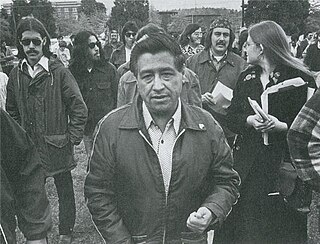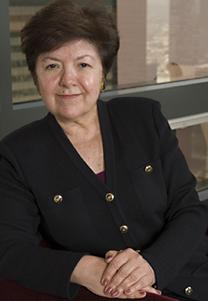Related Research Articles

Chicano or Chicana is a chosen identity for Mexican Americans in the United States. The identity has also evolved into Xicano or Xicana and, more recently, Xicanx. Chicano/a is sometimes used interchangeably with Mexican American, although the terms have different meanings. While Mexican American identity emerged to encourage assimilation into white American society and separate the community from African American political struggle, Chicano/a identity emerged among anti-assimilationist youth, some of whom belonged to the Pachuco/a subculture, who reclaimed the term. Chicano/a was widely reclaimed in the 1960s and 1970s to express political empowerment, ethnic solidarity, and pride in being of Indigenous descent, diverging from the more assimilationist Mexican American identity. Chicano Movement leaders were influenced by and collaborated with Black Power leaders and activists. Chicano/a youth in barrios rejected cultural assimilation into whiteness and embraced their identity and worldview as a form of empowerment and resistance.
El Grito del Norte was a bilingual newspaper based in Española, New Mexico. Co-founded by activist Elizabeth "Betita" Martinez and attorney Beverly Axelrod in 1968, the paper was originally the publication of the Reies Tijerina's Alianza Federal de Mercedes, an organization dedicated to recovering the lands of dispossessed Hispanos. It expanded to provide coverage of the Chicano Movement in urban areas, workers' struggles, and Latino political prisoners, as well as other Leftist causes.

The Comisión Femenil Mexicana Nacional was a Mexican-American organization dedicated to economically and politically empowering Chicana women in the United States.

The Chicano Movement, also referred to as El Movimiento, was a social and political movement inspired by prior acts of resistance among people of Mexican descent, especially of Pachucos in the 1940s and 1950s, and the Black Power movement, that worked to embrace a Chicano/a identity and worldview that combated structural racism, encouraged cultural revitalization, and achieved community empowerment by rejecting assimilation. Prior to the Movement, Chicano/a was a classist term of derision, reclaimed only by some Pachucos who adopted it as an expression of defiance to Anglo-American society. As a result of the Movement, Chicanismo arose and Chicano/a was widely reclaimed in the 1960s and 1970s to express political autonomy, ethnic and cultural solidarity, and pride in being of Indigenous descent, diverging from the assimilationist Mexican-American identity.
Chicana feminism, also called Xicanisma, is a sociopolitical movement in the United States that analyzes the historical, cultural, spiritual, educational, and economic intersections of Mexican-American women that identify as Chicana. Chicana feminism challenges the stereotypes that Chicanas face across lines of gender, ethnicity, race, class, and sexuality. Most importantly, Chicana feminism serves as a movement, theory and praxis that helps women reclaim their existence between and among the Chicano Movement and American feminist movements.
The Mexican American Legal Defense and Educational Fund (MALDEF) is a national non-profit civil rights organization formed in 1968 to protect the rights of Latinos in the United States. Founded in San Antonio, Texas, it is currently headquartered in Los Angeles, California and maintains regional offices in Sacramento, San Antonio, Chicago, and Washington, D.C.
Norma V. Cantú is an American civil rights lawyer and educator. She is currently a professor of law and education at the University of Texas at Austin. She served as the Assistant Secretary of Education for the Office for Civil Rights under President Bill Clinton and as regional counsel for the Mexican-American Legal Defense and Educational Fund.
Las Adelitas de Aztlán was a short-lived Mexican American female civil rights organization that was created by Gloria Arellanes and Gracie and Hilda Reyes in 1970. Gloria Arellanes and Gracie and Hilda Reyes were all former members of the Brown Berets, another Mexican American Civil rights organization that had operated concurrently during the 1960s and 1970s in the California area. The founders left the Brown Berets due to enlarging gender discrepancies and disagreements that caused much alienation amongst their female members. The Las Adelitas De Aztlan advocated for Mexican-American Civil rights, better conditions for workers, protested police brutality and advocated for women's rights for the Latino community. The name of the organization was a tribute to Mexican female soldiers or soldaderas that fought during the Mexican Revolution of the early twentieth century.

John David Trasviña is a human rights attorney. He is the former dean of the University of San Francisco School of Law. Previous to that, he was Assistant Secretary of the Office of Fair Housing and Equal Opportunity in the U.S. Department of Housing and Urban Development, president and general counsel of the Mexican American Legal Defense and Education Fund (MALDEF), and Special Counsel for Immigration Related Unfair Employment Practices at the U.S. Department of Justice.

Vilma Socorro Martínez is an American lawyer, civil rights activist and diplomat who formerly served as the U.S. Ambassador to Argentina (2009-2013).
Mario Guerra Obledo was an American civil rights leader. He was called the "Godfather of the Latino Movement" in the United States, credited with establishing numerous civic institutions and bringing Latino interests into the center of the U.S. political arena. He also served as California's Secretary of Health and Welfare from 1975 to 1982.
Chicana literature is a form of literature that has emerged from the Chicana Feminist movement. It aims to redefine Chicana archetypes in an effort to provide positive models for Chicanas. Chicana writers redefine their relationships with what Gloria Anzaldúa has called "Las Tres Madres" of Mexican culture by depicting them as feminist sources of strength and compassion.
Madrigal v. Quilligan was a federal class action lawsuit from Los Angeles County, California involving sterilization of Latina women that occurred either without informed consent, or through coercion. Although the judge ruled in favor of the doctors, the case led to better informed consent for patients, especially those who are not native English speakers.
Francisca Flores was a labor rights activist, an early Chicana feminist, a journal editor, and an anti-poverty activist.
Hijas de Cuauhtémoc was a student Chicana feminist newspaper founded in 1971 by Anna Nieto-Gómez and Adelaida Castillo while both were students at California State University, Long Beach.

No Más Bebés is an American documentary film that tells the story of immigrant women who were sterilized upon going into labor. Having been sterilized without knowing at the Los Angeles County-USC Medical Center, the mothers sued county doctors, the State of California, and the U.S. government. Having collected hospital records from a whistleblower, Chicana lawyer Antonia Hernandez led the lawsuit against powerful institutions.

La Conferencia de Mujeres por la Raza was held in Houston, Texas between May 28 and May 30 in 1971. The conference marked the first time Mexican-American feminists came together within the state from around the country to discuss issues important to feminism and Chicana women. It was considered the first conference of its kind by the Corpus Christi Caller-Times.
Gregoria Ortega is a Mexican American activist and religious sister. She is best known for her support of students in an Abilene school walkout and her co-creation of the religious organization for Hispanic sisters and lay women in the Catholic Church, Las Hermanas. She continues work as an activist today.

Antonia Hernández is a Latina attorney, activist, and philanthropist. She currently serves as the President and CEO of the California Community Foundation, which is a non-profit organization focused on addressing the needs of marginalized communities in the Los Angeles area, specifically people of color and low income. Hernández is notable through her involvement in Madrigal v. Quilligan (1975), the class-action lawsuit filed by ten women of Mexican descent who were involuntarily sterilized at the Los Angeles County Hospital. She is also the first Latina to serve as staff counsel to the U.S. Senate Judiciary Committee from 1979–1980. In addition, Hernández served on the campaign team for Senator Ted Kennedy in his 1980 presidential campaign. She previously served as president and general counsel of the Mexican American Legal Defense and Education Fund (MALDEF) from 1985 to 2004.
Martha Menchaca is an academic in the fields of social anthropology, ethnicity, gender, oral history, legal anthropology, immigration, and Chicana/o Studies on the relationship between U.S. and Mexican culture. Menchaca is recognized for her research on immigration, naturalization, and birthright citizenship. She is currently a professor at the University of Texas, Austin in the Department of Anthropology.
References
Citations
- 1 2 Orozco, Cynthia E. (2010-06-12). "Chicana Rights Project". Handbook of Texas Online. Texas State Historical Association. Retrieved 2017-09-14.
- ↑ Flores 2008, p. 82.
- ↑ Flores 2008, p. 83.
- 1 2 Flores 2008, p. 87.
- ↑ "1972 Feminist Flurry From the Ford Foundation". The Philanthropy Roundtable. Retrieved 2017-09-14.
- 1 2 3 Flores 2008.
- 1 2 3 4 Flores 2008, p. 93.
- 1 2 3 4 5 Flores 2008, p. 91.
- ↑ Langley, Roger (1982-02-08). "Is Sterlization Involuntary?". The San Bernardino County Sun. p. 14. Retrieved 2017-09-13– via Newspapers.com.
- 1 2 3 Orozco, Cynthia E. (2006). Ruiz, Vicki L.; Korrol, Virginia Sánchez (eds.). Latinas in the United States, set: A Historical Encyclopedia (Chicana Rights Project). Indiana University Press. p. 151. ISBN 0253111692.
- 1 2 3 Mancillas, Linda Kay (2010). O'Connor, Karen (ed.). Gender and Women's Leadership: A Reference Handbook (Women's Leadership in the Latina/o Movement). Thousand Oaks, California: SAGE. p. 210. ISBN 9781412960830.
- 1 2 Flores 2008, p. 92.
- 1 2 Flores 2008, p. 88.
- 1 2 Flores 2008, p. 89.
- ↑ Flores 2008, p. 86.
- ↑ Flores 2008, p. 96.
- ↑ Flores 2008, p. 98-99.
- 1 2 Flores 2008, p. 99.
- 1 2 3 Flores 2008, p. 100.